First Love
Brief Synopsis
Cast & Crew
Henry Koster
Deanna Durbin
Robert Stack
Eugene Pallette
Helen Parrish
Lewis Howard
Film Details
Technical Specs

Synopsis
Unlike her classmates, orphan Constance Harding is sorry to graduate from Miss Wiggins' school for girls because her only relatives, the wealthy James Clinton family, show little interest in her. They send their butler George to bring her to New York, however, and Connie finds herself in a household of self-centered Park Avenue snobs. Only the servants care about Connie, who enchants them with her sweetness and beautiful singing voice. One afternoon, Connie's cousin, Barbara Clinton, orders her to prevent socially prominent Ted Drake from going riding without her and Connie makes a fool of herself trying to keep Ted from leaving the stable grounds. When Barbara arrives, she sends Connie home, refusing to tell Ted that Connie is her cousin. Infatuated with Ted, Connie is overjoyed when she learns that the Drakes have invited the Clinton family to a ball. Because her only gown is her rather unfashionable graduation dress, the servants secretly pay for a new gown and evening slippers for her out of their own pockets. On the night of the ball, the selfish Barbara tells a lie to her mother Grace which results in Connie having to stay home. She is heartbroken, but the servants arrange to have the Clinton limousine stopped by Mike, the cook's policeman brother, and detained until midnight. Soon Connie is given a police motorcycle escort and the chief of police's car to rush to the ball, on condition that she leave by midnight. She is the sensation of the ball, captivating the audience with her singing, and Ted dances with her all evening, still unaware of her identity. After he kisses her, she suddenly realizes that it is midnight and runs away, narrowly missing Grace and Barbara, and loses one of her slippers on the staircase. While Ted is looking for its owner, Barbara realizes that Connie was at the ball. She goes home and confronts Connie, then makes up a story that Ted had merely been playing up to her for a gag. The next morning George informs Mr. Clinton that he is leaving because Barbara fired all of the servants and Connie has left. Enraged, Mr. Clinton finally lays down the law to his family and tells George that he must find Connie. Meanwhile, Connie returns to Miss Wiggins', hoping to become a music teacher. Miss Wiggins, realizing that Connie is trying to hide a broken heart, tells her to sing "One Fine Day" from Puccini's Madame Butterfly at an upcoming teacher's conference. While Connie performs the tragic love song, Ted arrives and takes her away, as Miss Wiggins smiles broadly.

Director

Henry Koster
Cast

Deanna Durbin

Robert Stack
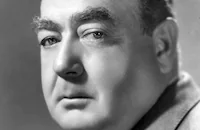
Eugene Pallette

Helen Parrish
Lewis Howard
Leatrice Joy
June Storey
Frank Jenks
Kathleen Howard
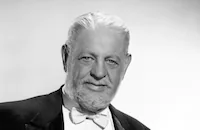
Thurston Hall
Marcia Mae Jones
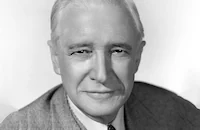
Samuel S. Hinds
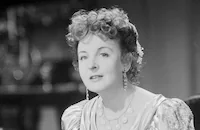
Doris Lloyd
Charles Coleman
Jack Mulhall
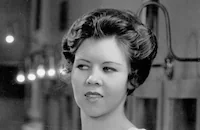
Mary Treen
Dorothy Vaughan
Lucille Ward
Crew
Stephen Morehouse Avery
Sir Henry Rowley Bishop
Bernard B. Brown
Bernard W. Burton
Ralph Freed
Albert Gamse
R. A. Gausman
Giuseppe Giacosa
Lionel Houser
Luigi Illica
Henry Koster
Joseph M. Lacalle
Joseph Lapis
Bruce Manning
Henry Myers
Martin Obzina
Jack Otterson
Joe Pasternak
John Howard Payne
Charles Previn
Giacomo Puccini
Gertrude Purcell
H. J. Salter
Andres De Segurola
Frank Shaw
Frank Skinner
Johann Strauss
Joseph Valentine
Vera West

Film Details
Technical Specs

Award Nominations
Best Art Direction
Best Cinematography
Best Score
Articles
Robert Stack, 1919-2003
Stack was born in Los Angeles on January 13, 1919 to a well-to-do family but his parents divorced when he was a year old. At age three, he moved with his mother to Paris, where she studied singing. They returned to Los Angeles when he was seven, by then French was his native language and was not taught English until he started schooling.
Naturally athletic, Stack was still in high school when he became a national skeet-shooting champion and top-flight polo player. He soon was giving lessons on shooting to such top Hollywood luminaries as Clark Gable and Carol Lombard, and found himself on the polo field with some notable movie moguls like Darryl Zanuck and Walter Wanger.
Stack enrolled in the University of Southern California, where he took some drama courses, and was on the Polo team, but it wasn't long before some influential people in the film industry took notice of his classic good looks, and lithe physique. Soon, his Hollywood connections got him on a film set at Paramount, a screen test, and eventually, his first lead in a picture, opposite Deanna Durbin in First Love (1939). Although he was only 20, Stack's natural delivery and boyish charm made him a natural for the screen.
His range grew with some meatier parts in the next few years, especially noteworthy were his roles as the young Nazi sympathizer in Frank Borzage's chilling The Mortal Storm (1940), with James Stewart, and as the Polish flier who woos a married Carole Lombard in Ernst Lubitsch's To Be or Not to Be (1942).
After serving as a gunnery officer in the Navy during World War II, Stack returned to the screen, and found a few interesting roles over the next ten years: giving Elizabeth Taylor her first screen kiss in Robert Thorp's A Date With Judy (1948); the leading role as an American bullfighter in Budd Boetticher's The Bullfighter and the Lady (1951); and as a pilot in William Wellman's The High and the Mighty (1954), starring John Wayne. However, Stack saved his best dramatic performances for Douglas Sirk in two knockout films: as a self-destructive alcoholic in Douglas Sirk's Written on the Wind (1956), for which he received an Academy Award nomination for supporting actor; and sympathetically portraying a fallen World War I pilot ace who is forced to do barnstorming stunts for mere survival in Tarnished Angels (1958).
Despite proving his capabilities as a solid actor in these roles, front rank stardom oddly eluded Stack at this point. That all changed when Stack gave television a try. The result was the enormously popular series, The Untouchables (1959-63). This exciting crime show about the real-life Prohibition-era crime-fighter Eliot Ness and his G-men taking on the Chicago underworld was successful in its day for several reasons: its catchy theme music, florid violence (which caused quite a sensation in its day), taut narration by Walter Winchell, and of course, Stack's trademark staccato delivery and strong presence. It all proved so popular that the series ran for four years, earned an Emmy for Stack in 1960, and made him a household name.
Stack would return to television in the late '60s, with the The Name of the Game (1968-71), and a string of made-for-television movies throughout the '70s. His career perked up again when Steven Spielberg cast him in his big budget comedy 1941 (1979) as General Joe Stillwell. The film surprised many viewers as few realized Stack was willing to spoof his granite-faced stoicism, but it won him over many new fans, and his dead-pan intensity would be used to perfect comic effect the following year as Captain Rex Kramer (who can forget the sight of him beating up Hare Krishnas at the airport?) in David and Jerry Zucker's wonderful spoof of disaster flicks, Airplane! (1980).
Stack's activity would be sporadic throughout the remainder of his career, but he returned to television, as the host of enormously popular Unsolved Mysteries (1987-2002), and played himself in Lawrence Kasden's comedy-drama Mumford (1999). He is survived by his wife of 47 years, Rosemarie Bowe Stack, a former actress, and two children, Elizabeth and Charles, both of Los Angeles.
by Michael T. Toole

Robert Stack, 1919-2003
Quotes
Trivia
Deanna Durbin's character gives her birthdate as 4 December -- Durbin's own.
Deanna Durbin receives her first screen kiss from Robert Stack.
Notes
Pre-release titles of the film were Cinderella, and After Schooldays. Charles Perrault's fairy tale was not acknowledged as the basis for the film, although it loosely follows many of the incidents of his work, as most reviews pointed out. According to a news item in Hollywood Reporter, June Storey was borrowed from Republic for the film. A Motion Picture Daily news item on April 20, 1939 noted that Universal was planning to make Cinderella as its first Technicolor feature, the picture was ultimately made in black-and-white, however. First Love marked Robert Stack's film debut. Reviews and publicity for the film noted that it was also the first film in which popular juvenile star Deanna Durbin was kissed. The picture was nominated for Academy Awards in the Art Direction and Music (Scoring) categories.
Other filmed versions of Perrault's fairy tale include a 1914 Famous Players Film entitled Cinderella, directed by James Kirkwood and starring Mary Pickford (see AFI Catalog of Feature Films, 1911-20; F1. 0690); a 1950 animated Walt Disney feature of the same name; a 1955 M-G-M musical version, directed by Charles Walters and starring Leslie Caron, entitled The Glass Slipper; a 1960 Paramount film called Cinderfella, that was directed by Frank Tashlin and starred Jerry Lewis in the title role; and a 1976 British production entitled The Slipper and the Rose, directed by Bryan Forbes, starring Richard Chamberlain and Gemma Craven. Richard Rodgers and Oscar Hammerstein II also wrote a musical play based on the story that was first shown on CBS Television in 1957.

Miscellaneous Notes
Released in United States 1939
Released in United States 1939













